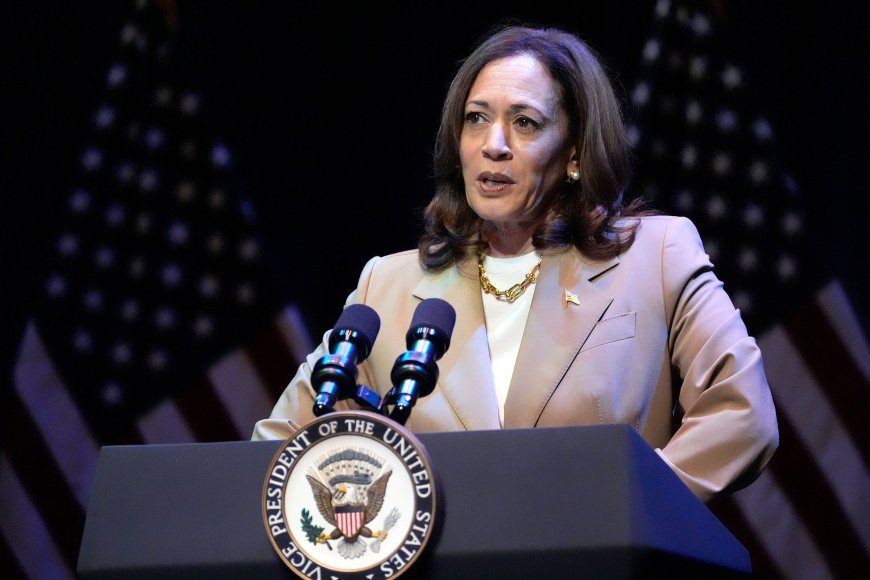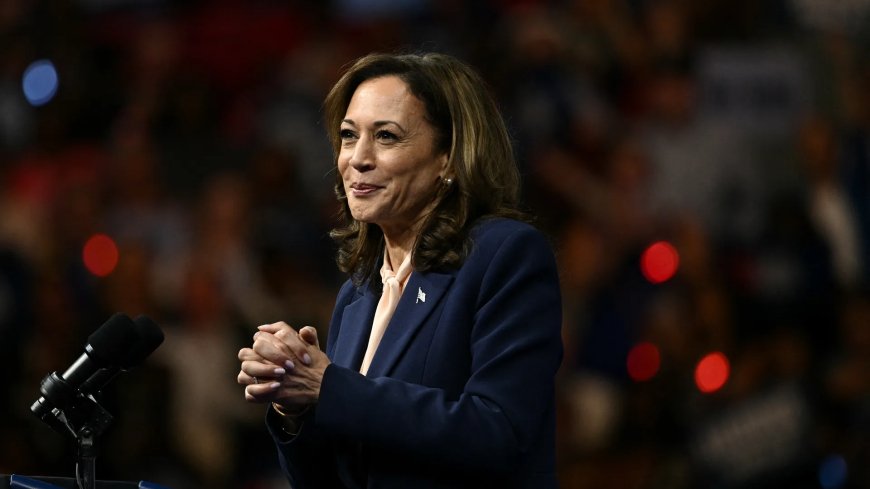The Complete Guide to Kamala Harris Policies on Criminal Justice Reform
This companion explores Kamala Harris programs and conduct on felonious justice reform, their elaboration, the difficulties girding them, and their implicit long-term impact.

Preface
Kamala Harris the first womanish Vice President of the United States, has had a long and influential career in public service, particularly when it comes to issues of felonious justice reform. Throughout her career, from her days as District Attorney of San Francisco to Attorney General of California, and now as Vice President, Harris has dealt with the complications of felonious justice from multiple angles. Her programs have both evolved and sparked debates, reflecting a balance between reformist ideals and her background as a former prosecutor.
A Prosecutor’s Perspective Harris’ Beforehand Career and Approach to Criminal Justice
San Francisco District Attorney (2004-2011)
Kamala Harris entry into felonious justice reform began with her election as District Attorney of San Francisco in 2004. At the time, San Francisco had a growing concern about crime rates, and Harris ran on a platform that emphasized both tough-on-crime measures and progressive reform. Still, her term as DA saw Harris walk a fine line between traditional prosecutorial duties and sweats to introduce reform within the system.
Smart on Crime Initiative
Harris enforced a policy frame that she nominated "SSmart on Crime," which sought to reevaluate traditional approaches to felonious justice. Rather than fastening solely on harsh corrections for non-violent malefactors, her programs aimed to reduce recidivism by diving into root causes like poverty, lack of education, and severance. This approach was meant to balance public safety with recuperation.
Her "SSmart on Crime" action honored that over-punishing certain crimes, particularly low-position medicine offenses, didn't reduce crime long-term and contributed to the mass incarceration extremity. Harris sought alternatives to incarceration, particularly for first-time malefactors, including job training programs and educational openings. One of the crucial factors of her platform was Back on Track, a program that gave first-time, non-violent malefactors the occasion to avoid jail time by sharing in recuperation programs, which included job training, comforting, and community service.
review Over Tough-on-Crime programs
Although Harris tried to move towards reform, her time as DA wasn't without controversy. Critics argue that, despite her reformist rhetoric, her conduct didn't always match her progressive language. Harris was frequently indicted of being too corrective, particularly when it came to executing low-position medicine offenses, which disproportionately impacted nonage communities. She also faced counterreactions for defending her office’s programs in certain cases, similar to when her office opposed statewide reforms on issues like the Three Strikes Law, which numerous believed unfairly penalized minor malefactors. thisforbes
California Attorney General (2011-2017)
Harris’ programs on felonious justice reform took a public stage when she became the Attorney General of California in 2011, overseeing the entire state’s legal frame. As Attorney General, Harris had the occasion to legislate broader reforms, and her time in this office significantly shaped her approach to public felonious justice policy.
Reducing Recidivism and Captivity Overcrowding
As California’s Attorney General, Harris dived into the state’s issue of captivity overcrowding, which had reached extremity situations. The Supreme Court ruling in 2011 forced California to reduce its captivity population, and Harris helped apply programs aimed at easing the strain on the system. One of her major benefits to this was championing for and promoting medicine recuperation programs as alternatives to incarceration.
She continued her focus on reducing recidivism by supporting community-rooted victims to captivity, similar to restorative justice programs, internal health treatment, and vocational training. She also promoted the use of technical courts like medicine courts and expert courts that concentrated on recuperation rather than discipline.
Controversial stations on police responsibility
During her term, Harris also came under fire for her station on police responsibility. Despite the growing public discussion around police violence and the need for reform, Harris defied sweats to open independent examinations into police misconduct. She especially opposed calls for body cameras on police officers across the state, citing enterprises over sequestration and logistics.
Numerous critics argued that her position on these issues reflected a disinclination to challenge law enforcement, which they saw as antithetical to her progressive station on felonious justice reform. Harris, still, has defended her record by emphasizing her sweats to cover police officers while also promoting community safety.
Proposition 47: Reducing Penalties for Nonviolent Crimes
One of the most significant reforms Harris supported as Attorney General was Proposition 47, a ballot action passed in 2014 that reclassified certain non-violent felonies, like medicine possession and petty theft, as misdemeanors. This reform was seen as a major step toward reducing mass incarceration, as it allowed thousands of people to avoid captivity time for low-position crimes.
Harris’ support of Proposition 47 aligned with her belief that the felonious justice system was exorbitantly corrective for minor offenses, disproportionately affecting communities of color. Although some opponents argued that Proposition 47 led to an increase in property crimes, the law was a critical move toward permitting non-violent offenses and reducing California’s captivity population.

Kamala Harris as U.S. Senator Evolving on Criminal Justice Reform
When Harris became a U.S. Senator in 2017, she brought her prosecutorial background to the public stage. Her term in the Senate saw her shift towards further progressive programs, reflecting both the changing political climate and her own evolving station on felonious justice reform.
Bipartisan Support for Reform
As a Senator, Harrisco sponsored several crucial pieces of bipartisan legislation aimed at reforming the felonious justice system. One notable illustration was the First Step Act, passed in 2018. The law aimed to reduce obligatory minimal rulings for certain non-violent crimes, particularly medicine offenses, and better the conditions within civil incarcerations by furnishing convicts with job training, medicine treatment, and educational openings.
Harris’ support for the First Step Act showed her ability to work across party lines to address the most striking issues within the felonious justice system, similar to the overuse of obligatory minimums and the lack of funds for recuperation within the captivity system. Her support of this legislation demonstrated her uninterrupted commitment to moving down from exorbitantly corrective measures toward programs concentrated on redemption and recuperation.
Ending Cash Bail
One of the central pillars of Harris’ public felonious justice reform docket was her drive to end the use of cash bail. Harris has long argued that the cash bail system is innately discriminative, as it disproportionately punishes low-income individuals who cannot go to pay bail, keeping them behind bars simply because of their fiscal status.
In 2018, Harris introduced the Bail Reform Act, which sought to replace cash bail with a threat-based system that would assess whether an individual posed a flight threat or trouble to the community. Although the bill didn't pass, it laid the root for unborn conversations on reforming the pretrial detention system.
championing for Condemning Reform
Harris also concentrated her efforts on sentencing reform. As Senator, she supported legislation aimed at reducing obligatory minimal rulings, particularly for non-violent medicine offenses. Harris has argued that obligatory minimums disproportionately impact nonage communities, contributing to the systemic ethnic difference in the felonious justice system.
One of the crucial pieces of legislation Harris supported was the Condemning Reform and Corrections Act, which sought to reduce obligatory minimal rulings for certain offenses and handed civil judges with further discretion when issuing rulings. Although the bill stalled in Congress, Harris’ support reflected her belief that exorbitantly harsh sentencing laws contribute to mass incarceration and should be reformed.
Kamala Harris as Vice President Continuing the Push for Criminal Justice Reform
As Vice President, Harris has continued to endorse felonious justice reform, though her part now involves supporting the Biden administration’s docket. President Joe Biden has committed to felonious justice reform, and Harris has played a critical role in shaping and promoting programs aimed at reducing mass incarceration, promoting police responsibility, and advancing equity within the system.
George Floyd Justice in Policing Act
One of the most significant pieces of legislation that Harris has supported as Vice President is the George Floyd Justice in Policing Act, which was introduced in the wake of the civil demurrers against police violence following the payoff of George Floyd in 2020. This legislation seeks to address systemic racism and police brutality by banning chokeholds, confining no-knock clearances, creating a public police misconduct registry, and reducing the legal norms for executing law enforcement officers involved in misconduct.
While the bill has faced challenges in passing through the Senate, Harris remains an oral advocate for police reform and has called for lesser translucency and responsibility within law enforcement.
Ending private incarcerations
Another area where Harris has concentrated her sweats as Vice President is the drive to end private incarcerations. Private incarcerations have long been blamed for their profit-driven approach to incarceration, which numerous argue incentivizes mass incarceration and leads to worse conditions for convicts. Harris has echoed President Biden’s call to phase out civil contracts with private captive drivers, a step that the administration has formally begun to take.
Addressing ethnic differences in police
Harris has also been an oral exponent of addressing the ethical difference in policing and the felonious justice system. She has called for a comprehensive approach to reform that not only focuses on police responsibility but also seeks to attack the root causes of crime in marginalized communities. This includes investing in education, healthcare, casing, and job training programs as part of a broader strategy to reduce crime and help incarceration.
Conclusion
The Future of Kamala Harris Criminal Justice Reform Programs Kamala Harris' approach to felonious justice reform has been shaped by her experience as a prosecutor, Attorney General, Senator, and now Vice President. While her programs have evolved over time, Harris has constantly emphasized the need for a further indifferent and humane felonious justice system that prioritizes recuperation over discipline.
Despite facing review for some of her opinions, particularly during her time as a prosecutor, Harris has surfaced as a public advocate for reform. Her uninterrupted efforts to address issues such as mass incarceration, ethical difference, police responsibility, and sentencing reform suggest that she'll remain a commanding voice on these critical issues in the times to come.
As felonious justice reform continues to be a pressing issue in the United States, Kamala Harris programs and conduct will probably play a pivotal part in shaping the future of the system, both in civil and state situations.
Also Read This Article: The Complete Guide to Resolving errordomain=nscocoaerrordomain&errormessage=could not find the specified shortcut.&errorcode=4 Issues






























